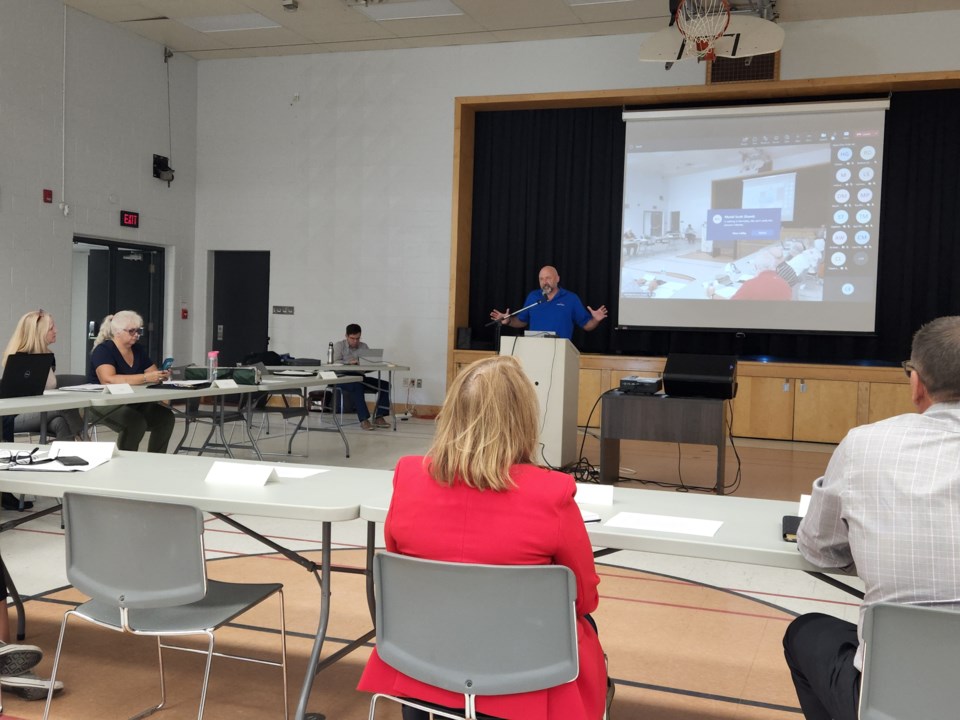The housing crisis being felt across Grey and Bruce counties is not going to be solved overnight and real solutions will require change, creative thinking and a cooperative approach.
Bruce-Grey-Owen Sound MP Alex Ruff gathered local leaders, municipal representatives and charitable organizations together to talk about housing at a special forum held in Owen Sound on Sept. 1.
“We all know we have a massive problem here,” said Ruff. “It’s going to be an all-hands-on-deck approach.”
Close to 60 people attended the meeting in person at the Sydenham Campus, while another 40 participated virtually. Ruff acknowledged that solutions would take time, but he felt it was important to get as many organizations in the same room to talk about short and medium term actions that could yield results.
Grey County Housing Director Anne Marie Shaw and Deputy CAO Randy Scherzer spoke at the meeting.
“There is no single approach to address the housing crisis,” said Scherzer. “It needs to be a multi-pronged approach”
Shaw said Grey County council has committed one per cent of the annual tax levy (approximately $600,000) for affordable and attainable housing purposes. The county is also dedicating provincial funding received to the issue.
“We are looking to how we can use these funds to help spur on the development of more affordable housing,” she said.
Scherzer said there are many challenges and obstacles to face. He noted that the cost of land and construction continue to rise and the increase in interest rates hasn’t helped. He also noted there is a need for housing across the spectrum including: emergency housing, transition housing, rental housing and affordable housing for families.
Scherzer said the province allowing inclusionary zoning would be a significant step forward. Inclusionary zoning would allow municipalities to require developers to include a certain percentage of units to be affordable. He said more community education programs to help end NIMBYism found around affordable/attainable housing would also help. He said the federal and provincial governments transferring surplus lands they own for affordable housing would be a major benefit. He also said colleges need more support for trades and apprenticeship programs to grow the workforce in skilled trades.
Scherzer also said the county is working with its lower-tier municipalities to update Official Plan and zoning bylaws to remove outdated policies that might discourage the development of affordable housing units.
Bruce County Manager of Human Services Tina Metcalfe said her county supports inclusionary zoning and is working on programs to increase density and restrict short-term accommodations, which can take potential housing rental stock off the market. Bruce County is also working on strategies to engage homeowners and landlords who may have available rental units, but are reluctant to rent them out.w
United Way of Bruce Grey Executive Director Francesca Dobbyn urged the group to remember availability of affordable housing is one part of the issue and the other is income levels.
“We’ve been having this conversation for 10 years. This is an income issue. It’s not budgeting. It’s not right-sized housing. It’s an income issue,” said Dobbyn, who said lower-income residents bringing in $1,600 a month are facing rents of $1,500 plus utilities. “People don’t have enough money, people need more money in their households.”
Dobbyn urged the creation of programs that help those in need to meet each other for dialogue and conversation. She said those kinds of programs would encourage people to share space and find “golden girls” solutions to their housing needs.
Dobbyn also said the focus of the housing market needs to be changed.
“We’re not building for (people in) the trades. We’re building for people from Toronto, who can work from home, to cash in,” she said.



